

Renaissance Plans Congo City Bigger Than Kenya’s $5 Billion Tatu. U. of Chicago's Plans for Milton Friedman Institute Stir Outrage on the Faculty - Faculty. By Peter Schmidt The University of Chicago's plan to move ahead with developing a controversial institute named for Milton Friedman has prompted more than 170 of the university's faculty members to sign a petition complaining that it is becoming increasingly "corporatized" and that its president, Robert J.
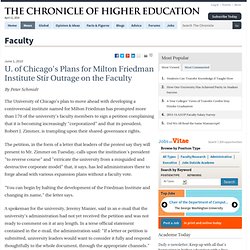
Zimmer, is trampling upon their shared-governance rights. The petition, in the form of a letter that leaders of the protest say they will present to Mr. Zimmer on Tuesday, calls upon the institution's president "to reverse course" and "extricate the university from a misguided and destructive corporate model" that, it says, has led administrators there to forge ahead with various expansion plans without a faculty vote. Wild Card – last chapter: Bibi and Obama pave the way for one-state solution. What is Neoliberalism? "Neo-liberalism" is a set of economic policies that have become widespread during the last 25 years or so.
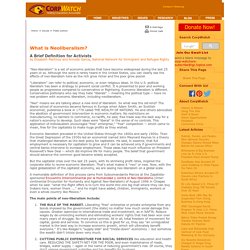
Although the word is rarely heard in the United States, you can clearly see the effects of neo-liberalism here as the rich grow richer and the poor grow poorer. "Liberalism" can refer to political, economic, or even religious ideas. In the U.S. political liberalism has been a strategy to prevent social conflict. It is presented to poor and working people as progressive compared to conservative or Rightwing. Economic liberalism is different. "Neo" means we are talking about a new kind of liberalism. Titanium or Water? Trouble brews in Southern India.
More than 5,000 people converged this month in the southern Indian state of Tamil Nadu to protest a deal that set the stage for the state government to appropriate almost 10,000 acres of land and hand it over to Tata Steel Corporation, a subsidiary of India’s largest conglomerate.
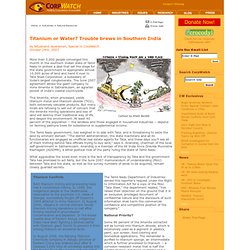
The June 2007 agreement allows the giant company to mine ilmenite in Sathankulam, an agrarian pocket of India's coastal countryside. This ilmenite, when processed, yields titanium metal and titanium dioxide (TiO2), both extremely valuable products. But many locals are refusing to sell out of concern that the ilmenite mining operations and loss of land will destroy their traditional way of life and despoil the environment. At least 40 percent of the population -- the landless and those engaged in household industries -- depend on farming palmyra trees for subsistence or supplemental income. Neocon ideas, free-trade theory discredited.
Free trade, the political-economic theory of the so-called Neocons, was completely discredited last week when America’s financial markets collapsed.
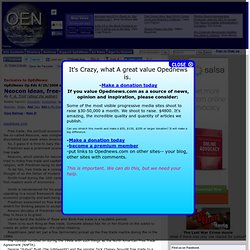
So, I guess it is time to bury the late Milton Friedman, who died in 2006. Friedman was a prominent economist of the late 20th century who championed the idea of free trade. Neocons, which stands for neoconservatives, learned about free trade from Friedman and than tried to make free trade and capitalism synonymous terms. They view free trade almost as a religion, with Friedman being its deity. London School of Economics. The London School of Economics and Political Science (informally the London School of Economics or LSE) is a public research university specialised in social sciences located in London, United Kingdom, and a constituent college of the federal University of London. Founded in 1895 by Fabian Society members Sidney Webb, Beatrice Webb, Graham Wallas and George Bernard Shaw, LSE joined the University of London in 1900 and first issued degrees to its students in 1902.[4] Despite its name, LSE conducts teaching and research across a range of social sciences, as well as in mathematics, statistics, philosophy and history.[5] LSE is located in Westminster, central London, near the boundary between Covent Garden and Holborn in an area historically known as Clare Market.
The School has produced many notable alumni in the fields of law, economics, philosophy, business, literature and politics. History[edit] Origins[edit] 20th century[edit] 21st century[edit] DRC: Minerals Flow Abroad, Misery Remains. International companies and local elites in the Democratic Republic of Congo (DRC) are pocketing revenues from copper and cobalt production instead of sharing it with local communities or spending it to reduce poverty, a watchdog group charged Wednesday.
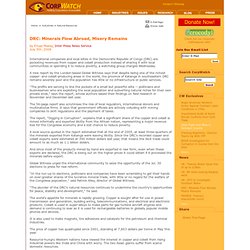
A new report by the London-based Global Witness says that despite being one of the richest copper- and cobalt-producing areas in the world, the province of Katanga in southeastern DRC remains severely poor and the population has little or no infrastructure or public services. "The profits are serving to line the pockets of a small but powerful elite -- politicians and businessmen who are exploiting the local population and subverting natural riches for their own private ends," says the report, whose authors based their findings on field research in November and December last year.
The 56-page report also scrutinises the role of local regulators, international donors and multinational firms. Labour Behind the Label. Neoliberalism: origins, theory, definition. Since the 1990's activists use the word 'neoliberalism' for global market-liberalism ('capitalism') and for free-trade policies.
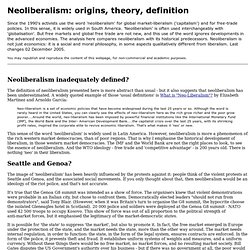
In this sense, it is widely used in South America. 'Neoliberalism' is often used interchangeably with 'globalisation'. But free markets and global free trade are not new, and this use of the word ignores developments in the advanced economies. The analysis here compares neoliberalism with its historical predecessors.
Neoliberalism is not just economics: it is a social and moral philosophy, in some aspects qualitatively different from liberalism. The essence of neoliberalism. As the dominant discourse would have it, the economic world is a pure and perfect order, implacably unrolling the logic of its predictable consequences, and prompt to repress all violations by the sanctions that it inflicts, either automatically or —more unusually — through the intermediary of its armed extensions, the International Monetary Fund (IMF) and the Organization for Economic Cooperation and Development (OECD) and the policies they impose: reducing labour costs, reducing public expenditures and making work more flexible.
Is the dominant discourse right? Milton Friedman Institute for Research in Economics. Between 2008 and 2011, the Milton Friedman Institute for Research in Economics was an academic center established at the University of Chicago as a collaborative, cross-disciplinary site for research in economics.
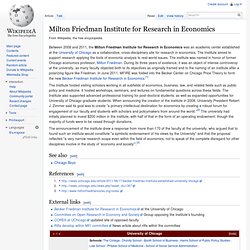
The Institute aimed to support research applying the tools of economic analysis to real-world issues. The institute was named in honor of former Chicago economics professor, Milton Friedman. During its three years of existence, it was an object of intense controversy at the university, as many faculty objected both to its objectives as originally framed and to the naming of an institute after a polarizing figure like Friedman. Tom McCarthy: 'Abu Ghraib images revealed the poetic truth of the neoliberal project' – video. Neoliberalism in international relations. Neoliberal international relations thinkers often employ game theory to explain why states do or do not cooperate;[1] since their approach tends to emphasize the possibility of mutual wins, they are interested in institutions which can arrange jointly profitable arrangements and compromises.
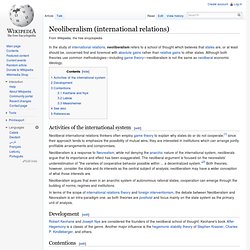
The 10 Countries That Are Trying To Be The Next China. When a Paradigm Falls and Nobody Hears It. The neoliberal status quo is indefensible—yet the public silently accepts its supposed legitimacy.
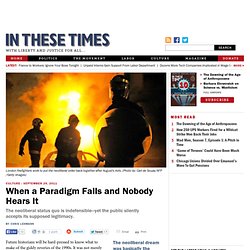
Neoliberalism. ADM's New Frontiers: Palm Oil Deforestation and Child Labor. ADM used to be known as the country’s corporate welfare king, and its top executives drew headlines as they perp-walked to prison.
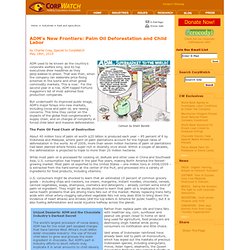
That was then, when the company ran elaborate price-fixing schemes in the lysine and other global commodity markets. This is now: For the second year in a row, ADM topped Fortune magazine’s list of most admired food production companies. But underneath its improved public image, ADM’s major forays into new markets, including cocoa and palm oil, are raising concerns. The Triumph of Capitalism: Jobless Nations.
The Obama administration is intent on applying supply side principles to get the American economy out of the present recession, but supply side principles are based on the belief that if the government cuts taxes on the wealthy, they will invest their savings in new factories, that newly hired workers will increase employment, and that more output will increase tax receipts. But there is no way to make sure the wealthy actually invest their wealth in productive enterprises, especially in the U.S. This entire theory is based on the mere pop-psychological belief that if you give a person money, s/he will invest it in productive ways.
But nothing forces wealthy people to do that, and they haven’t, worse, never really have, since creating jobs is not an essential business function, only making money is, and getting financial incentives from government is merely another way of making money, Giving money to businesses will not end recessions or depressions. The Lesson of the Chinese Invasion. Misguided and bigoted demagoguery distracts from the real crisis staring at us in our own mirror—a crisis not of other, but of self. Many economic Nostradamuses have long predicted that the epitaph on America’s tombstone will ultimately read “Made In China.” But casual observers probably didn’t think the funeral procession would happen this fast.